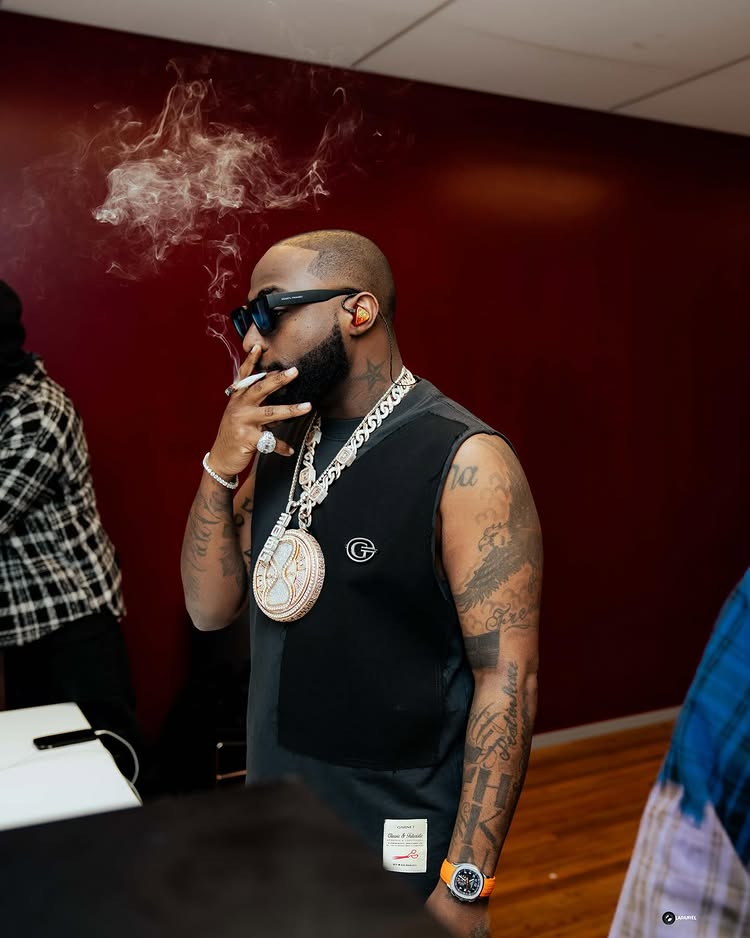Nigerian Afrobeats superstar Davido has ignited a significant conversation about drug classification while revealing his foundation’s plans to combat substance abuse among youth. The Grammy-nominated artist’s recent appearance on The Morning Hustle podcast has brought attention to the complex relationship between personal substance use and advocacy for drug abuse prevention.
During the candid interview, Davido, whose real name is David Adeleke, addressed what might seem like a paradox to some: his commitment to fighting drug abuse while maintaining his own use of cannabis. The artist drew a distinct line between what he considers hard drugs and cannabis, stating explicitly, “I don’t count weed as a hard drug.” This stance has opened up a broader dialogue about drug classification and the nuances of substance abuse prevention.
The timing of Davido’s announcement is particularly significant as it comes amid growing concerns about drug abuse in Nigeria and across Africa. The artist’s recognition of escalating addiction issues demonstrates his awareness of a pressing social crisis. “A lot of people have been going through a lot recently. Drug addiction is becoming rampant,” he observed, highlighting the urgency of addressing substance abuse among young people.
Through his foundation’s initiative, Davido plans to direct resources toward orphanages and programs specifically designed to combat drug abuse. This commitment represents a significant step in leveraging his considerable influence and financial resources for social impact. The choice to focus on youth addiction particularly resonates given his massive following among young Africans and his understanding of the challenges they face.
The artist’s openness about his own cannabis use while advocating for drug abuse prevention raises important questions about the complexity of drug policy and prevention strategies. His position reflects a growing global conversation about the differentiation between various substances and their classification in both legal and social contexts. This distinction has become increasingly relevant as numerous countries revisit their cannabis policies while maintaining strict stances on other substances.
The announcement has generated varied reactions from public health experts, fans, and social commentators. While some praise Davido’s commitment to addressing drug abuse, others question whether his personal stance on cannabis might complicate the message of drug abuse prevention. This tension highlights the ongoing challenge of navigating substance use education in an era of evolving attitudes and policies.
Davido’s influence as one of Africa’s most prominent musical artists adds significant weight to his engagement with this issue. His music has consistently topped charts across the continent and beyond, making him a powerful voice in shaping youth culture and perspectives. This latest initiative demonstrates his understanding of the responsibility that comes with such influence.
The artist’s approach to this sensitive topic reflects a broader shift in how public figures address personal substance use while advocating for harm reduction and addiction prevention. Rather than adopting an absolutist stance, Davido’s nuanced position acknowledges the complexities of substance use while maintaining a clear stance against addiction and abuse.
From a public health perspective, Davido’s initiative comes at a crucial time when many African nations are grappling with increasing rates of substance abuse among young people. His foundation’s focus on this issue could potentially catalyze more comprehensive discussions about prevention strategies and support systems for those struggling with addiction.
The intersection of celebrity influence, public health advocacy, and personal conduct continues to evolve, and Davido’s latest announcement exemplifies the complex dynamics at play. As his foundation moves forward with its anti-drug abuse initiatives, the effectiveness of its approach and the impact of his personal stance on cannabis will likely be closely watched by both supporters and critics.
The conversation sparked by Davido’s announcement extends beyond simple drug classification to touch on broader questions about responsibility, influence, and the role of public figures in addressing social issues. As this initiative develops, it may well serve as a case study in how personal authenticity and social advocacy can coexist in the realm of drug abuse prevention.



